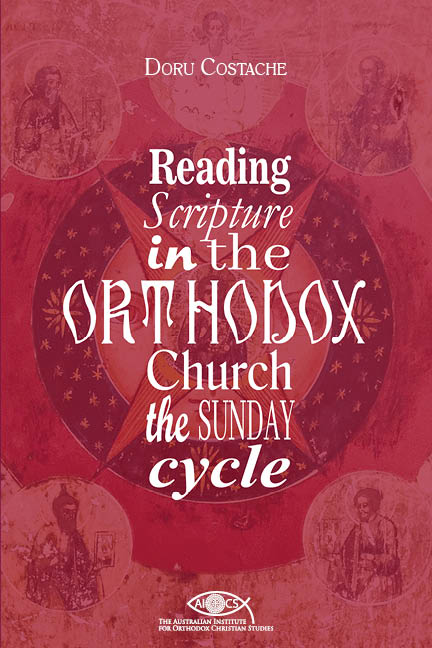The AIOCS Short Courses 2021
[Free content © AIOCS]
The Pre-Lenten Narrative: Preparatory Reflections
The first part: The Thirty-Second Sunday after Pentecost
22 February
Protopresbyter Dr Doru Costache
The scriptural readings prescribed for this Sunday: 1 Timothy 4,9–15. Luke 19:1–10.
An interpretive framework: Doru Costache, Reading Scripture in the Orthodox Church: A Diary (Sydney: AIOCS Press, 2018) 82–84.
Summaries
1 Timothy 4:9–15 The apostle advised Timothy to pursue the course of Christian life with hope, without neglecting his duties as a minister to God’s people. He had to be an example of love, faith, and purity of life for all, also by drawing from Scripture the wisdom shared with the assembly. He had to observe these despite the suspicion of senior believers that his young age disqualified him from being a shepherd. Given the mandate of the elders who ordained him, Timothy had to shine through virtue in the eyes of all.
Luke 19:1–10 Jesus was visiting Jericho where enthusiastic crowds acclaimed him. Zacchaeus, the tax collector who illicitly had become rich, desired to see the Lord. Given his short stature, he climbed up a tree to get a good vantage point. Jesus told him that he would like to be his guest on that day. Glad to be of service and genuinely moved to compunction, during the meal Zacchaeus expressed readiness to give half of his fortune to the poor and to compensate those affected by his greed. Jesus proclaimed that Zacchaeus was a son of Abraham (thus a member of the faithful) and that salvation was granted to his household.
Wisdom
The two passages introduce the pre-lenten narrative. By way of select scriptural readings, the next several Saturdays and Sundays invite discussion of the right cast of mind for Lent and life overall (Matthew 6:14–21; Luke 15:11–32; 18:10–14; Romans 13:11–14.4; 14:19–23; 1 Corinthians 8:8–9:2; 10:23–28). True fasting entails ceasing to judge others, converting to a virtuous life, and loving others—as opposed to false fasting, which entails merely changing dietary habits. In the same vein, today’s readings cast light upon two wrong attitudes towards people. Here is the first illustration. Zacchaeus was a greedy man whose actions caused great distress to other citizens; a sinner by all intents and purposes. Nevertheless, his faults could not justify the judgmental attitude of those who ostracised him. According to their stereotype, a tax collector was invariably impure and unworthy to be in the presence of the “righteous.” But the Lord knew very well that sinners could convert, if they wished, and therefore gave Zacchaeus an opportunity to change. Zacchaeus seized the opportunity and radically shifted his outlook of life, freeing himself from the slavery of materialism. By deciding to become a human being, merciful and compassionate, he earned the title “son of Abraham,” Abraham being the father of all believers (Romans 4:16–17; Galatians 3:7). But the judges of Zacchaeus also judged Christ, who sided with a sinner. Here is the second illustration. Saint Timothy was judged for no other sin than the fact of being too young a minister. This is another stereotype—youth is incapable of holiness and wisdom. By advising him to stay the course and not be troubled by innuendo, Saint Paul revealed that spiritual progress and maturity are not conditioned by length of days. In the Christian life age is as irrelevant as the differences of gender, ethnicity, and social status (Galatians 3:27–28). Unlike the case of Zacchaeus, there is no evidence that Timothy was a sinner. Paul, his teacher in Christ, has given testimony to his good character (2 Timothy 3:14–15). Timothy’s story is therefore not about turning from worse to better. It is a story of gradual advancement in faith and life. The fact of the matter is that at a young age he managed to become holy and wise, more so than the elders of the community to which he ministered. The attitude of the elders who despised their young bishop was therefore unjustified both because one should not judge another (Matthew 7:1–5) and because there was nothing untoward in his behaviour. Like the judgmental attitude of Zacchaeus’ accusers, their criticism was against the Christian ethos. But the judges of Timothy also judged Paul, who appointed him a bishop. In providing these examples, today’s readings teach related lessons. Christians should not consider the sins of others; they should attend to their own sins. Christians should not judge others who, out of love, show compassion to sinners. Christians should not despise others; the others may be more mature than themselves. Christians should not despise others who, out of discernment, made a decision which the “righteous” cannot comprehend. This is what Christianity is about. This is what Lent is about.
Message
Sinners can change and age is meaningless when it comes to the spiritual progress; stereotypes are unhelpful when one considers the lives of others.
Keywords
change, holiness, judgmental, sin, wisdom
22 February 2021 © AIOCS
Please support our not-for-profit ministry (ABN 76649025141)
For donations, please go to https://www.paypal.com/paypalme/aiocsnet or contact us at info@aiocs.net


